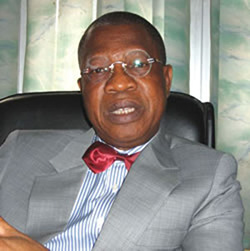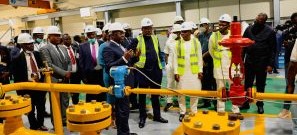Advertisements

By Segun Esan and Romanus Emezie –
On August 12, 2016, the Vice President of Federal Republic of Nigeria announced that the Bureau of Public Enterprises (BPE), in collaboration with Infrastructure Concession Regulatory Commission (ICRC), established the Project Steering Committee (PSC) to be headed by the Hon. Minister of Transport, Chief Rotimi Amaechi and Project Delivery Team (PDT) for the concession of the Nigerian Railway Corporation.
It is also worthy of note that the said Bureau of Public Enterprises (BPE) had already engaged the Global Infrastructure Facility (GIF) and World Bank in discussions on accessing funding for Transaction Advisers (TA) while a task force headed by the Hon. Minister of Finance had been constituted as far back as April 2016, to drive the concession process. Meanwhile, in a bidding process that remains generally unknown to the public, General Electric had been picked as the concessionaire by the Federal Government.
The hurried and secret nature of the whole process has raised palpable fears among workers of the Nigeria Railways Corporation that yet another round of state orchestrated asset stripping that has characterized the sale of hundreds of State Owned Enterprises is underway yet again. As most observers of the Nigerian privatization process have noted, most privatized corporations in Nigeria remain comatose years after their privatization while workers in those companies were left with the short end of the stick. Even the most sympathetic of the privatization process agree that the following serious issues have generally bedeviled the entire process:
It has been consistently observed that assets of privatized enterprises have been deliberately undervalued, there has been no due process with high level collusion between the authorities and the companies that bought the privatized enterprises, leading to failure to pay over the appropriate monies to government coffer. The BPE has also failed to exercise its oversight function on the privatization process.
For example, the giant Ajaokuta Steel Company was sold to an Indian consortium that rather than turn around the ailing company as expected; proceeded on a frenzied asset -stripping of valuables to India. The Ajaokuta Integrated Steel Complex was conceived and steadily developed with the vision of erecting a metallurgical process plant and engineering complex that could be used to generate important upstream and downstream industrial and economic activities that were critical to the diversification of the economy into an industrial one. The thermal power plant of the company is capable of generating 110MW of electricity per day which can service three states in the country. Today, the company is in a dilemma. Workers are owed months and years of accumulated salary arrears and allowances. Business activities have paled to insignificance, with very little attention from the Federal Government.
Another example is Daily Times of Nigeria (DTN). The new buyers were apparently more interested in selling off DTN’s properties in London than in revamping the fortunes of the newspaper.
The privatization of the Aluminum Smelter Company of Nigeria, built at the cost of $3.3bn but transferred to Rusal, a Russian company at the cost of $250m, is also another scandal. Only $130m of the said $250m has been paid, leaving a balance of $120m which was supposed to be used to dredge the Imo River, as stated in the Share Purchase Agreement. Years after the sale, the dredging is yet to start and government has not been paid the balance of the money.
The NITEL privatization dilemma and that of Egbin power station are easily the best examples of how policy inconsistency of government coupled with corruption and abuse of due process could negatively affect the outcome of privatization exercise. NITEL was the dominant fixed line operator, which controls about 77 per cent of fixed line telecom services in Nigeria and operates in all 36 states of the country and the Federal Capital Territory. M- Tel, its fully owned subsidiary, is the number four mobile telephony operator, with approximately one million subscribers as at the end of 2005. NITEL has the most extensive network in Nigeria with the ability to provide telecom services to its customers throughout the country. In addition, NITEL has shares in several companies including the South Atlantic Telecommunication/ West African Submarine Cable Organization (SAT3 / WASC), (7.33%); Regional African Satellite Organization (RASCOM), (6.91%); International Maritime Satellite Organization (INMARSAT), (0.21%), International Telecommunication Satellite Organization- liquidated in 2005 as a result of Intelsat privatization (INTELSAT) (0.60%); as well as ICO Global Communications Ltd (I-Co) (0.07%). NITEL’s ‘privatization’ passed through IILL, Orascom, Transcorp etc. with all manner of twists and turns while the company was bled of billions of naira through asset stripping.
Delta Steel Company Limited presents another dimension where a company, Global Steel Infrastructure Limited, which did not participate in the bidding process, was declared the winner. Global Steel merely submitted an expression of interest and did not follow up with a technical bid. BUA, which actually won the bid, was denied the opportunity of reaping the fruits of the bid. Delta Steel was valued by BPE at N225bn but was sold for a paltry N4.5bn.
The privatization of the power sector offers another insight on the failed promise of privatization and the grand fraud that the exercise has amounted to. Two years after the ‘unbundling’ of the erstwhile NEPA and sale of the nation’s electricity generation and distribution assets to GENCOs and DISCOs, at give – away sums, at least three tariff hikes in the two year period as well as government ‘bail-out’ amounting to hundreds of billions of naira of public funds, electricity supply remain epileptic and comatose all over the country.
Indeed, it has been observed that out of 450 public corporations privatized in the last thirty years, only about 90 are functional while most of those assets amounting to hundreds of billions of dollars have had their prized assets stripped and subsequently abandoned.
It is in the light of this we want to alert the general public to call into question the basis of continuing to follow a path that has consistently meant grand losses to the Nigerian nation and people.
“Also aware that the federal government had already constituted a task force headed by the Honourable Minister of Finance to drive the transaction process as was approved on Tuesday 16 April, 2015 by the NCP, contrary to the provisions of the BPE Act; Further aware that the Federal Government is already in discussions with General Electric with a view to procuring them as concessionaire for the NRC tracks;” the motion read.
To boost the transformation of the railway infrastructure in the country, the Federal Government is proceeding with the concession of the eastern and western lines of the Nigerian Railways. To this end, a Steering Committee was inaugurated at the Presidential Villa on Friday, 12th August, 2016 in order to get the job done promptly. Speaking at the inauguration of the committee, Vice President Yemi Osinbajo said that the purpose of the committee is to create a one-stop shop for the concession, fast track the process and beat the redtape and bureaucratic bottlenecks. He said the steering committee on the concession of the nation’s railway headed by the Transportation Minister, Mr. Chibuike Rotimi Amaechi, should be innovative, urging the members to remove whatever obstacles that stand in the way of a smooth concession process. He also hoped that the committee will meet its deadlines and end up to be an example of how such assignment should be done.
Conversely, the lawmakers in a plenary had raised a motion querying what they described as an attempt by the Federal Executive Council to concession the Western (Lagos-Kano) and Eastern (Port Harcourt-Maiduguri) rail lines, to General Electric, without recourse to the Bureau of Public Enterprises, and privatization regulations. The move to investigate the concession agreement with GE comes after a motion raised by Honourable Chukwuemeka Ujam. The lawmakers said the action of the FEC is a part of attempts to pander to certain interests who want to see the nation’s core assets sold off and alleged that the move contravenes the Public Enterprises (Privatization and Commercialization) Act, 1999.
The chairman of the House Committee on Privatization, Yerima Ahmed, said by engaging the American firm, FEC had usurped the functions of the Bureau of Public Enterprises and the National Council on Privatizations. “Section 11 (j) outlines the procedures for privatization; there are four sections to be followed by the BPE and the agency is not being carried along. “The NCP has not been inaugurated, and in its absence, the BPE is the secretariat for any privatization.” He said.
The chairman of the House Committee on Foreign Relations, Nnenna Ukeje, said it is incomprehensible how such concession or privatization agreement would be deemed legal when the National Economic Stimulus Bill is yet to be signed into law.
The house committee on privatization was directed to investigate the matter and report back to the house in four weeks.
With the foregoing reality, it becomes imperative and rational to infer that the mooted ‘concession’ of the Nigerian Railways already exhibits the established pattern of selling or concession of public assets for cheap without appropriate technical valuation with fair labour disengagement/engagement policy framework in place. A price of 2 billion US dollars has already been placed on railway assets the GE whose area of comparative specialty is manufacturing of rolling stocks (locomotives, wagons, and coaching facilities) and never known to have run any railway outfit. This notwithstanding, the inventory on Nigerian Railway as directed by the federal government has been handed down to the concessionaire through its Transaction Advisor. How does that substitute for recommended high powered technical valuation panel that would be independent of those aspiring to participate in the concession deal?
Let it be made abundantly clear that, Nigerian Railway workers are NOT and will NOT be against the concession of Nigerian Railway assets ONLY if:
it is done with every sense of patriotism and due diligence with a view to making rail transport sub-sector the truly effective hub of transport system in Nigeria;
We will not antagonize the process if the federal government engages the workers in dialogue where our demand for a genuine and fair labour disengagement policy that guarantees our rights of fair severance benefits from the federal government are heard and fully met before conceding railway assets to a third party. This is the preferred choice of Nigerian railway workers to dangerous, seamless transfer of workers to a concessionaire who may choose to weed the inherited workforce into joblessness, squalor and perpetual psychological trauma;
Nigerian Railway workers will keep their peace if the federal government decides today, inter alia, to monetize the staff quarters to the workers as directed by the monetization policy of 2005 and which over a competent trial court of law has pronounced a sound judgment (Nigeria Union of Railway Workers & Anor Vs. Nigerian Railway Corporation & Ors, Suit No NICN/LA/11/2011 refers) validating our legitimate right for staff quarters to be fully monetized, after five consecutive years of legal battles between the railway workers and the agents of the State at the National Industrial Court of Nigeria. In spite of the fact that the staff quarters have been encumbered, the federal government has shown no commitment to respecting the rule of law by implementing the judgment of the court.
*Esan is Secretary General (NUR Branch) and Emezie is Secretary (SSA)




